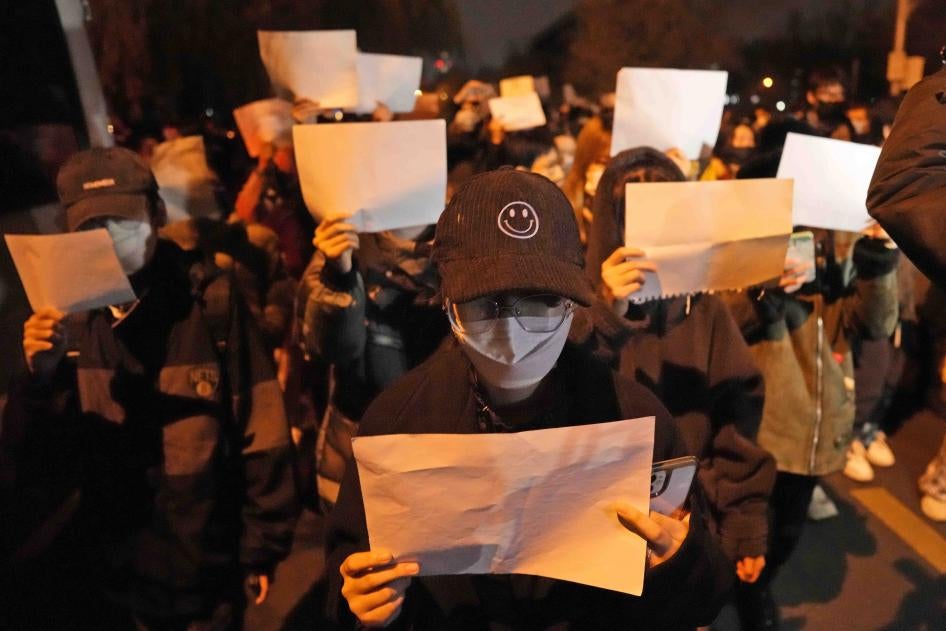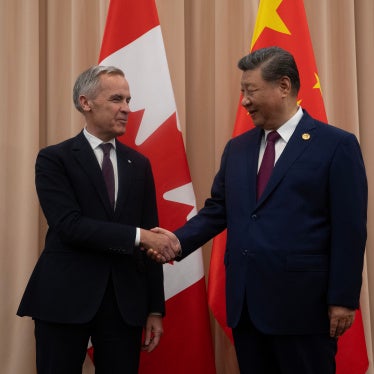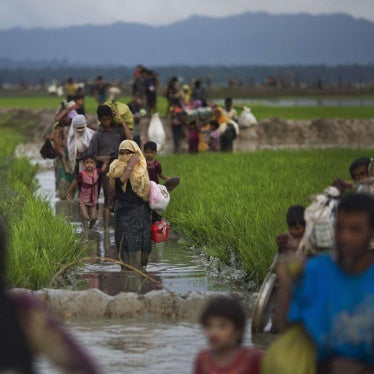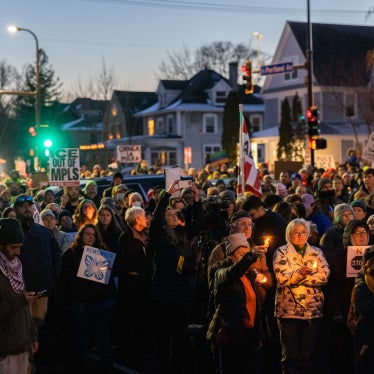(New York) – Chinese authorities should immediately release and drop all charges against everyone detained for participating in the “white paper” protests against the government, Human Rights Watch said today. The authorities should also cease harassment of lawyers and friends of protesters and the censorship of protest-related information on social media.
In November 2022, thousands of people across China, including in cities such as Shanghai, Beijing, Chengdu, and Wuhan, took to the streets to protest the government’s strict Covid-19 measures and to denounce the Chinese Communist Party’s authoritarian rule. Demonstrators held blank papers – hence “white paper” protests – and chanted slogans such as “End zero-Covid,” “We want human rights,” and “Down with the Communist Party!”
“Young people in China are paying a heavy price for daring to speak out for freedom and human rights,” said Yaqiu Wang, senior China researcher at Human Rights Watch. “Governments and international institutions around the world should show support and call on the Chinese authorities to release them immediately.”
The protests were in response to an earlier fire at an apartment building in Urumqi, the capital of China’s northwest Xinjiang region, in which at least 10 people were killed, reportedly because they were prevented from escaping the blaze due to pandemic control barriers. The protests – dominated by young people – also drew wide support from the Chinese diaspora, as thousands also staged rallies in major cities in over a dozen countries from New Zealand to Canada.
A few days after the protests, the government abruptly lifted most of the Covid restrictions nationwide. With low vaccination rates among China’s older population and medical professionals caught off guard, the decision resulted in a rapid surge in Covid infections, hospitalizations, and deaths across the country. The authorities suppressed Covid death and infection numbers by preventing hospitals and families from registering Covid as a cause of death.
Meanwhile, authorities across the country harassed or detained dozens of students, journalists, and others – notably many women – who participated in the protests. Some protesters have been released on bail. Others remain detained, with a number of them having been formally arrested. The current whereabouts or conditions of some of the detainees remain unknown.
In Beijing, Cao Zhixin (曹芷馨), a 26-year-old editor at a publishing house, was taken by the police a few days after she attended a riverside vigil to commemorate the victims of the Urumqi fire. In a recorded video, which was released after her detention, Cao said several friends had also been detained and called for public attention to their situation. Beijing police also detained Li Yuanjing (李元婧), an accountant; Zhai Dengrui (翟登蕊), a teacher; and Li Siqi (李思琪), a journalist. The four were all later formally arrested on the charge of “picking quarrels and provoking trouble.”
Under article 293 of China’s Criminal Law, the crime carries a sentence of up to five years in prison for first-time offenders. The offense – activists call it a “pocket crime” – is broadly defined and is frequently used by authorities to criminalize peaceful protests and online criticism of the Chinese government.
In Shanghai, the authorities detained Li Yi (李艺) and Chen Jialin (陈佳林), who participated in the protest on Urumqi Middle Road on November 24, which inspired later protests across the country. Their whereabouts and legal status are unclear.
The authorities released a few protesters on bail, including the Beijing-based journalist Yang Liu (杨柳) and the Shenzhen-based filmmaker and journalist Qin Ziyi (秦梓奕), an alumna of the University of Chicago, whose Center for East Asia Studies issued a statement calling for her release, so far the only foreign institution of higher education known to have done so.
More protesters are believed to have been detained or forcibly disappeared, though their cases are not publicly known, given the Chinese authorities’ practice of threatening detainees’ families to keep silent. An overseas human rights group, Chinese Human Rights Defenders, and an anonymous Chinese activist group have maintained rolling lists of protesters arrested, forcibly disappeared, and released, though Human Rights Watch is unable to independently verify all of the cases on these lists.
The police have also threatened lawyers who tried to provide legal assistance to the detained protesters and suspended a group chat the lawyers use on the Chinese social media app, WeChat. Authorities have harassed friends of detained protesters who provided them support.
On the Chinese internet within the Great Firewall, information related to the “white paper” protests is selectively censored. Weibo and WeChat accounts that showed support for the protests were suspended. A WeChat account that merely posted a picture of a blank paper was permanently removed. At the same time, posts and comments that blamed the protesters for the surge of Covid deaths following the policy reversal were widespread on social media. “National security officers, thank you for your hard work, [we] must not let [those protesters] loose,” a netizen said on Weibo. The post garnered over 4,000 likes.
“Attending a vigil and calling for authorities to respect human rights are not crimes,” Wang said. “The crackdown on protesters only revealed Beijing’s deep fear of the power of the country’s young people.”








